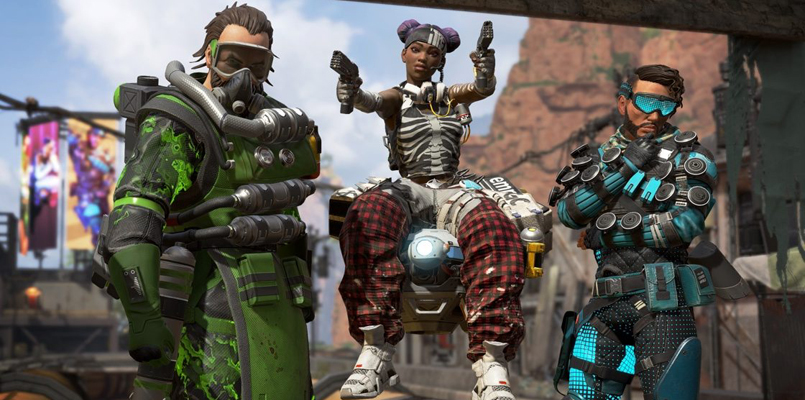Mentioned in this article
Electronic Arts’ (EA) attempt at growing an audience for Apex Legends on Twitch through esports has struggled to gain traction as viewership for the game continues to sit well below the high standard that it set for itself when it produced 30M hours watched multiple weeks in a row immediately following its release.
Last weekend, EA hosted an Apex Legends Preseason Invitational in Krakow, Poland, that boasted a $500K USD prize pool, and while the event managed to generate 1M hours watched on Twitch, its average concurrent viewership of 16K wasn’t among the top 20 highest averages for a channel in the past seven days.
Among esports-related channels alone, the average viewership of the event on its main channel (PlayApex) was below average viewership for channels covering the BLAST Pro Series, Overwatch League, League of Legends, and Hearthstone.
Though the event managed to give a boost to Apex Legends viewership week-over-week, it still struggled to match the effect that strong influencers have managed to bring to the title on Twitch. Last week, PlayApex accounted for just less than a third of the title’s 3.4M hours watched for the entirety of the week.
Much like tournaments for other battle royale games, namely Fortnite, the power that influential personality broadcasters can bring to the table trumps that of a developer-run event. The best viewership that Apex has had in the past month and a half came in the middle week of August when an influencer-based Twitch Rivals event took place that helped the game generate 4.8M hours watched for the week.
A large part of the bump in viewership for Apex Legends, in this case, wasn’t simply that fact that there was a tournament going on, but that there were influencers who were playing in the tournament and streaming their perspective.
Similar to Fortnite’s online “Skirmish” events and World Cup qualifiers in the past, top streamers were the ones who managed to generate a noticeable audience for the event, not the main broadcast for the event.

Top streamers of Apex on the week of Aug. 12-18 were Michael “Shroud” Grzesiek, Félix “xQc” Lengyel, and Herschel “DrDisrespect” Beahm, all of which averaged more viewers and hours watched than Twitch Rivals did.
Apex requiring influencers to draw an audience on Twitch isn’t anything new, though. In February when the game was released, the very first Twitch Rivals event for the game generated massive viewership on Twitch due largely to the who’s who of influencers that streamed their participation in the tournament.
With streamers like Grzesiek, Tyler “Ninja” Blevins, and Jaryd “Summit1g” Lazar competing, Apex Legends had its most hours watched in a single day with 8.3M on the day that the first Twitch Rivals competition took place.
The second Twitch Rivals event didn’t have nearly the same success. After numerous influencers started to exit the game, week two of the Twitch Rivals tournament for Apex Legends had a lot less star power, and viewership, in turn, suffered in comparison. On the day, Apex Legends had less than half the viewership it did for the first Apex Legends event with a total of 4M.
Since Apex Legends’ launch, numerous tournament organizers were attracted to the title because of its ties to EA as a battle royale game and its powerful entry on Twitch. FACEIT, T1, and even ESPN (which was streamed on ESPN’s self-titled app) have all attempted to leverage Apex Legends as the Fortnite-killing title that it showed the potential to be. But no tournament or esports event has managed to attract an audience that might bring Apex Legends back into the upper echelon of Twitch.
As was the case with much of Fortnite’s success before it, and even now, the ability to generate viewership for a battle royale title on Twitch is arguably more reliant on influencers than it is on esports. More specifically, the ability for top personality broadcasters to stream their perspective is key to the success of a battle royale as an esport.
Earlier this year, Epic Games held its second annual pro-am tournament at the Electronic Entertainment Expo in which several Twitch personalities played with mainstream celebrities, and while the event left at least some mark on Twitch, it didn’t have nearly the same amount of weight that online tournaments that allow broadcasters to stream has.
While some titles from other genres like Dota 2, Overwatch, or Rainbow Six Siege can develop themselves as primarily esports-driven tites on Twitch, the ability for battle royale games specifically to pull viewership sheerly through esports competition alone seems to be limited. Outside of a few extremely high-profile events like the Fortnite World Cup, there appears to be little room for battle royale esports if they don’t revolve around personalities.
This isn’t to suggest that Twitch’s top battle royale games like Apex Legends should simply cut bait on the prospect of using esports as a vehicle for growing interest in their game. However, instead of focusing on how a game can be made an “esport,” perhaps the primary goal of any organizing body should be to find a way to use esports as a way to highlight and promote the most valuable asset any title has on a platform like Twitch — its personalities.

